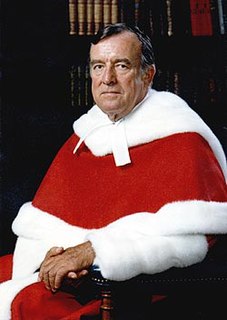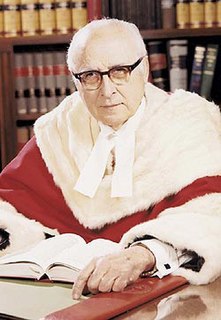Related Research Articles

The Supreme Court of Canada is the highest court of Canada, the final court of appeals in the Canadian justice system. The court grants permission to between 40 and 75 litigants each year to appeal decisions rendered by provincial, territorial and federal appellate courts. Its decisions are the ultimate application of Canadian law and binding upon all lower courts of Canada, except to the extent that they are overridden or otherwise made ineffective by federal or provincial legislation.
Section 33 of the Canadian Charter of Rights and Freedoms is part of the Constitution of Canada. It is commonly known as the notwithstanding clause, or as the override power, and it allows Parliament or provincial legislatures to temporarily override certain portions of the Charter.
The Canadian Charter of Rights and Freedoms, often simply referred to as the Charter in Canada, is a bill of rights entrenched in the Constitution of Canada, forming the first part of the Constitution Act, 1982. The Charter guarantees certain political rights to Canadian citizens and civil rights of everyone in Canada from the policies and actions of all areas and levels of the government. It is designed to unify Canadians around a set of principles that embody those rights. The Charter was signed into law by Queen Elizabeth II of Canada on April 17, 1982, along with the rest of the Act.

The Canadian Bill of Rights is a federal statute and bill of rights enacted by the Parliament of Canada on August 10, 1960. It provides Canadians with certain rights at Canadian federal law in relation to other federal statutes. It was the earliest expression of human rights law at the federal level in Canada, though an implied Bill of Rights had already been recognized in the Canadian Common Law.

Same-sex marriage in Canada was progressively introduced in several provinces by court decisions beginning in 2003 before being legally recognized nationwide with the enactment of the Civil Marriage Act on July 20, 2005. On June 10, 2003, the Court of Appeal for Ontario issued a decision immediately legalizing same-sex marriage in Ontario, thereby becoming the first province where it was legal. The introduction of a federal gender-neutral marriage definition made Canada the fourth country in the world, and the first country outside Europe, to legally recognize same-sex marriage throughout its borders. Before the federal recognition of same-sex marriage, court decisions had already introduced it in eight out of ten provinces and one of three territories, whose residents collectively made up about 90% of Canada's population. More than 3,000 same-sex couples had already married in those areas before the Civil Marriage Act was passed. Most legal benefits commonly associated with marriage had been extended to cohabiting same-sex couples since 1999.
The Constitution Act, 1982 is a part of the Constitution of Canada. The Act was introduced as part of Canada's process of patriating the constitution, introducing several amendments to the British North America Act, 1867, including re-naming it the Constitution Act, 1867. In addition to patriating the Constitution, the Constitution Act, 1982 enacted the Canadian Charter of Rights and Freedoms; guaranteed rights of the Aboriginal peoples of Canada; provided for future constitutional conferences; and set out the procedures for amending the Constitution in the future.

Robert George Brian Dickson,, commonly known as Brian Dickson, was a Canadian lawyer, military officer and judge. He was appointed a puisne justice of the Supreme Court of Canada on March 26, 1973, and subsequently appointed the 15th Chief Justice of Canada on April 18, 1984. He retired on June 30, 1990.
Patriation is the political process that led to full Canadian sovereignty, culminating with the Constitution Act, 1982. The process was necessary because under the Statute of Westminster 1931, with Canada's agreement at the time, the British parliament had retained the power to amend Canada's Constitution Acts, and to enact more generally for Canada at the request and with the consent of the Dominion. That authority was removed from the UK by the passing of the Canada Act 1982 on March 29, 1982, by the Parliament of the United Kingdom, as requested by the Parliament of Canada.

The Constitution Act, 1867 is a major part of the Constitution of Canada. The Act created a federal dominion and defines much of the operation of the Government of Canada, including its federal structure, the House of Commons, the Senate, the justice system, and the taxation system. The British North America Acts, including this Act, were renamed in 1982 with the patriation of the Constitution ; however, it is still known by its original name in United Kingdom records. Amendments were also made at this time: section 92A was added, giving provinces greater control over non-renewable natural resources.

Same-sex marriage in Saskatchewan became legal on November 5, 2004, as a result of a decision of the Family Law Division of the Saskatchewan Court of Queen's Bench. This decision followed similar cases in six other provinces and territories, and pre-dated by eight months the federal Civil Marriage Act of 2005, which made same-sex marriage available throughout Canada. Later court decisions have dealt with the issue of marriage commissioners who object to performing same-sex marriages on the basis of their religious beliefs.
Otto Emil Lang, is a Canadian lawyer and former politician.

Emmett Matthew Hall was a Canadian lawyer, civil liberties advocate, Supreme Court of Canada judge and public policy advocate. He is considered one of the fathers of the Canadian system of Medicare, along with his fellow Saskatchewanian, Tommy Douglas.
Section 1 of the Canadian Charter of Rights and Freedoms is the section that confirms that the rights listed in the Charter are guaranteed. The section is also known as the reasonable limits clause or limitations clause, as it legally allows the government to limit an individual's Charter rights. This limitation on rights has been used in the last twenty years to prevent a variety of objectionable conduct such as hate speech and obscenity.
Willard Zebedee "Bud" Estey, was a Canadian justice of the Supreme Court of Canada.
Wilbur Roy Jackett, was a Canadian scholar, public servant, jurist, and the first chief justice of the Federal Court of Canada.
Canadian constitutional law is the area of Canadian law relating to the interpretation and application of the Constitution of Canada by the courts. All laws of Canada, both provincial and federal, must conform to the Constitution and any laws inconsistent with the Constitution have no force or effect.
Human rights in Canada have come under increasing public attention and legal protection since World War II. Prior to that time, there were few legal protections for human rights. The protections which did exist focused on specific issues, rather than taking a general approach to human rights.
Elmer A. Driedger, (1913–1985) was a Canadian lawyer and a leading authority on statutory interpretation. He worked for the Canadian Department of Justice for over a quarter century, rising to Deputy Minister and later became a professor of law at the University of Ottawa.
Hate speech laws in Canada include provisions in the federal Criminal Code and in some other federal legislation. There are also statutory provisions relating to hate publications in some, but not all, of the provinces and territories.
Marc Nadon LL.L. is a supernumerary judge on the Canadian Federal Court of Appeal. He has practised law in both Quebec and the United Kingdom, focusing on maritime and transportation law. He was also an arbitrator and former lecturer in law at the Université de Sherbrooke. Nadon was nominated by Prime Minister Stephen Harper to be a puisne justice of the Supreme Court of Canada in October 2013. Following controversy about the appointment, the federal government referred the constitutionality of the appointment to the Supreme Court of Canada. In their decision in Reference Re Supreme Court Act, ss 5 and 6, the Supreme Court quashed his appointment, concluding he did not meet the eligibility criteria provided in the Supreme Court Act.
References
- ↑ "Governor General Announces New Appointments to the Order of Canada". Archived from the original on 2009-01-21.